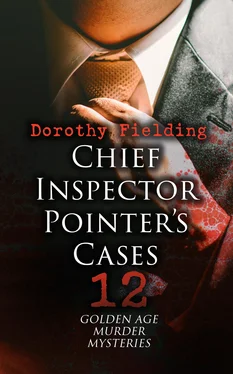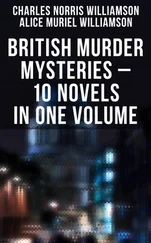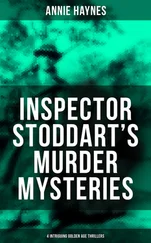Dear Mary,
I know you will be shocked by what I am about to do. But it is too late to enter into all that leads me to take the step you will soon learn of. I know your kind heart will not judge me harshly. I cannot think of yesterday calmly. Suppose I had not gone! I am taking the only possible way out of the trouble for all of us. I am not thinking only of myself, believe me.
And so, till we meet again dear, dear friend, in some future where all will be understood—good-bye.
Your affectionate,
Mable.
Pointer handed the letter back to Miss Eden.
"I do not think it will be needed. But please keep it carefully."
Mary hastened to slip it into a locked drawer as though she could not bear to look at it. There was a pause.
"Was Mrs. Tangye an impulsive woman?" Pointer asked.
"Very. To me she was always kindness itself. But there's no use saying she was an easy woman to live with. She wasn't."
"Would she be likely to take a strained view of anything not in itself wrong?"
Miss Eden looked surprised.
"It's odd your saying that. For Mrs. Tangye was most sensitive about what she considered deception. If she thought that things were being kept from her, she could be utterly deaf to reason, or even justice."
"Was she a frank woman herself?"
Mary Eden considered.
"She was a truthful woman," she said finally. "I don't know that I should call her a frank woman. She was too reserved for that."
Pointer asked a number of questions as to the person seen with Tangye at the flower-show.
Miss Eden could only repeat that she had barely glimpsed the sleeve of a very smart squirrel coat. Now Miss Saunders had a squirrel coat. Pointer had noticed her wearing it. Miss Eden went on to say that she seemed tallish. That, too, fitted the companion, as well as Mrs. Bligh.
Miss Eden felt quite sure that Tangye had not seen his wife. He and his companion had turned off at right angles, or rather, were already turning, when Mrs. Tangye had given her start and backward step.
Pointer left time for a little pause, then he said:
"You heard from Mr. Tangye, I see, about our visit?"
"No."
"Then how did you know that an innocent person was 'implicated in quite a wrong idea of Mrs. Tangye's death'?" Miss Eden made a little motion with her hand.
"That slipped out. I heard from Miss Ash about Philip Vardon. She often works down here. She's here now. And I've something to tell you about Mr. Vardon—and Mrs. Tangye"—she hesitated, evidently with little liking for the task.
"In a way, it seems like betraying the confidence of the dead. But she had a very keen sense of justice. I think it would grieve her now—where she is—if I kept silence. I heard what I'm going to tell you from Mrs. Tangye herself. I haven't spoken of it to Miss Ash. I thought of writing to Mr. Vardon, but I've decided that the quickest way, in the interests of justice would be to tell you.
"The day before Mr. Branscombe died, Mr. Vardon dropped in to see his cousin. From what followed, Mrs. Branscombe—as she was then, of course—thought that his call had been artfully planned. I don't see why it wasn't mere chance. She herself was out, getting a breath of air. She nursed her husband splendidly. He died of pneumonia, you know. Well, in the night she came in and found him working away on a new will. A will leaving the money to her, but the land and houses to Philip Vardon. When she asked her husband what it meant—the paper had slipped from under his pillow—he told her of Philip's call. Mr. Branscombe was too ill to be questioned much and towards morning he grew worse and died.
"Mable imagined a sort of conspiracy between her husband and his cousin. She thought they were trying to do something behind her back which should have been done openly. I understand that she flung the paper into the fire—it was only a draft, not even finished—and wrote Mr. Vardon a letter. It must have been a terrible one if it was anything like what she told me she said. I believe Mr. Vardon consulted a solicitor with a view to taking action. But he decided to do nothing. Mrs. Tangye kept the story to herself except for telling me, and Philip Vardon has a very forgiving nature. A very sweet temper. But, though Barbara doesn't know it, I feel sure that the screw he threatened to turn—she told me how important you think that speech—was that burnt paper. It was Mr. Branscombe's intention to alter his will. And in common justice, Mable should have carried out his wishes.
"Please don't misunderstand her," Mary Eden bent forward earnestly, "she was anything but a mean woman, but she thought poor Philip had tried by underhand scheming to trick her husband when he was too ill to be quite sure what he was doing. Philip Vardon! Who never had a scheming thought in his life? You can quite see now why she would give him that money, that fifteen hundred, can't you, and promise him the remainder of what the house fetched?"
Wilmot at any rate would be able to, Pointer thought a little ruefully,
"I quite expected she would have mentioned him in her will," Miss Eden went on, "I think she would have done so, if it hadn't been made at the time of her second marriage. While she still felt resentful."
"I've heard a rumour that another will's been found, leaving everything lock, stock, and barrel, to Mr. Vardon."
"Oh, no! That's quite out of the question. She never would have done that. It wouldn't have been fair to her husband. We were talking of wills only a little while ago—two or three months at most—and she said that she looked on the money invested in Mr. Tangye's firm as his absolutely. That she had told him so when they were married. But that she felt free to do what she liked with the rest."
The Chief Inspector left Mary Eden without telling her that she had done just as much harm as good to Vardon's case. Some might say she had given the prosecution a splendid motive; evidence of resentment or vengeance on Vardon's part.
Pointer imagined that the artist saw it in that light too. Hence his silence. Though Mrs. Tangye might have made it a condition of the handing over to him of the money. Might have accompanied it by some speech such as: "If I give you this, will you let bygones be bygones?"
Pointer did not drive himself this time. He sat back, lost in thought. He was trying to keep the whole series of loose facts in his grasp. Miss Eden's account had disappointed the Chief Inspector greatly. It had been of no help whatever as far as the incidents of the orchid-show were concerned. That letter did not sound like a meeting with Oliver Headly. Even Tangye and Miss Saunders, or Tangye and Mrs. Bligh could not account for it, he thought, could not have changed Mrs. Tangye's whole outlook on life. What had really happened down there? Whom had she seen, whom met when she had slipped away for those few minutes from her friend? Pointer felt that there must be far more here than he had yet learnt. Must be. Was Miss Eden's story true? Was that letter genuinely written after Mrs. Tangye's return Sunday night? The envelope was. And the letter matched its writing. Jerky, dashed off with quivering fingers.
The idea, born in Pointer's mind when he read that will the will leaving everything to Vardon, and nothing to Tangye—was stirring now.
He found, on his return to Scotland Yard, that two cables had come from Fez with a portrait—also cabled—of Olivier, gun-runner to the Riffs. Pointer had the portrait at once sent out to Oliver Headly's college at Oxford. No one was able to definitely recognise in the ragged, gaunt, man with the week's growth of beard, and the hard lines around his mouth and eyes, the young man who had had to leave sooner than he had intended. All agreed that it could very possibly be Oliver Headly after the sort of life he seemed to have led. Smith, the orchid-hunter, had also a copy shown him. He, too, could not be sure. He thought it was a picture of Headly, but he was not certain. It was the best that Pointer could do on that score, so he put it aside.
Читать дальше












